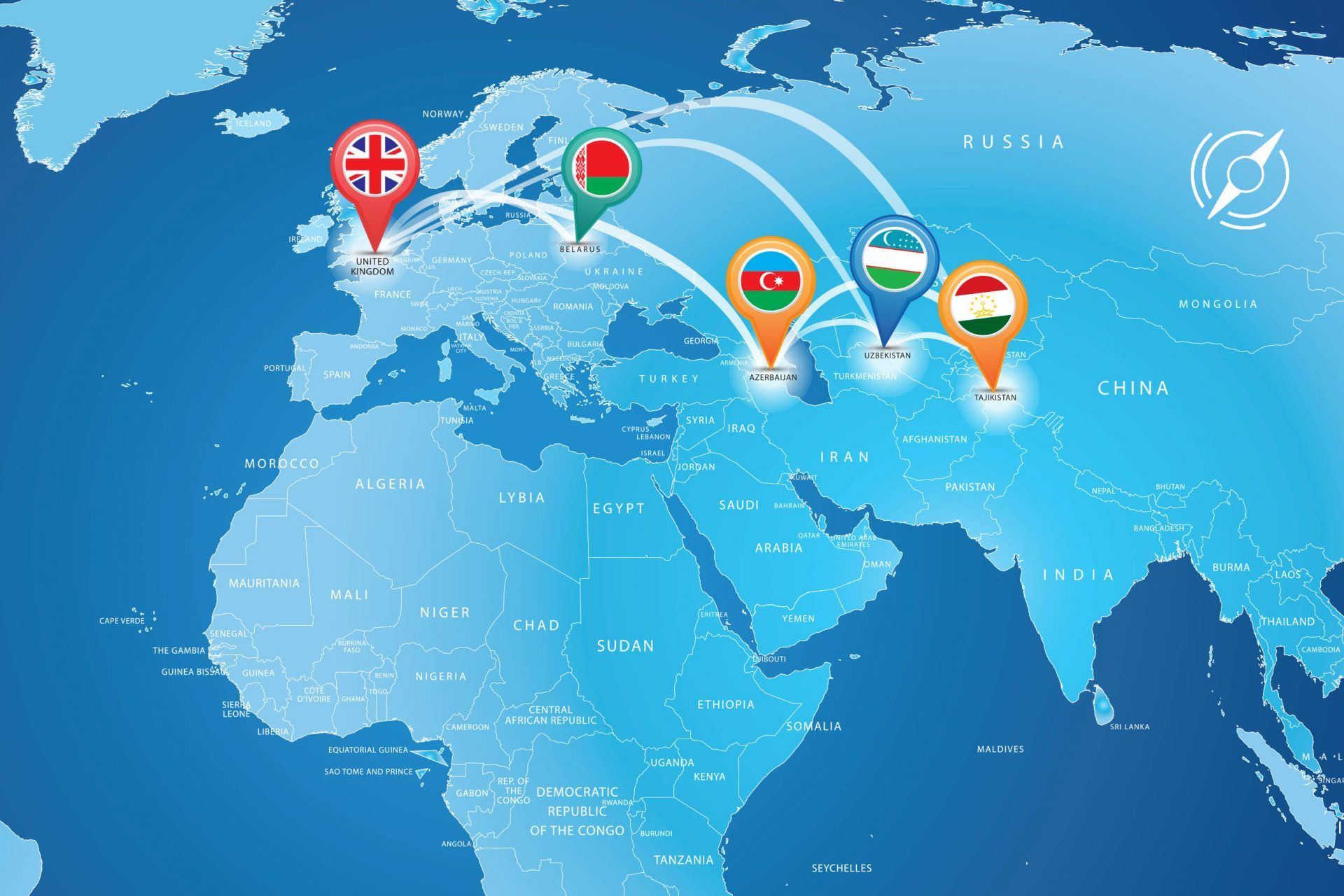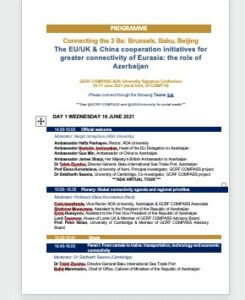International Workshop: “Enhancing connectivity and local communities in Uzbekistan: building resilient and adaptive governance”
Date: January 21, 2022. 14:30-18:00 (Tashkent time), 9:30-13:00 (London time)
Venue: Innovation and Scientific Research Cluster premises
Format: Blended (in-person and online)
Full programme and zoom link available here.
Connectivity in Central Asia and the Caucasus (6-9 December 2021) GCRF COMPASS Cambridge Signature Conference
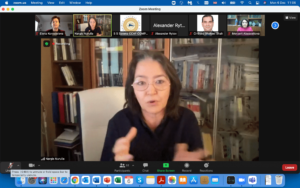 The final 4-day GCRF COMPASS Cambridge signature conference kicked in today, 6 December 2021. Titled as ‘Connectivity in Central Asia and the Caucasus’, it will host an amazing range of speakers from across the globe. Welcome words were provided by Professor Elena Korosteleva (PI) and Dr Siddharth Saxena (COI) reflecting on the project’s progress and challenges. This was further expanded by Prof. Magnus Marsden (Sussex), COMPASS Advisory Board member; Prof. Shailaja Fennell (Cambridge); Nick Ray (Cambridge) and Shakeel Shah (CAREC Institute).
The final 4-day GCRF COMPASS Cambridge signature conference kicked in today, 6 December 2021. Titled as ‘Connectivity in Central Asia and the Caucasus’, it will host an amazing range of speakers from across the globe. Welcome words were provided by Professor Elena Korosteleva (PI) and Dr Siddharth Saxena (COI) reflecting on the project’s progress and challenges. This was further expanded by Prof. Magnus Marsden (Sussex), COMPASS Advisory Board member; Prof. Shailaja Fennell (Cambridge); Nick Ray (Cambridge) and Shakeel Shah (CAREC Institute).
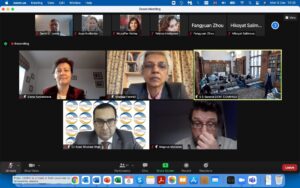 The first panel presented a diverse range of topics and geography, varying from the philosophy of knowledge in Central Asia (Dr Nargis Nurulla-Khodjaeva, MGU) to capacity-building activities in Belarus (Alexandr Rytov), Azerbaijani youth (Abbas Babaev), Taliban takeover in Afghanistan (DrAkram Umarov) and the rise of peoplehood in Belarus and Ukraine (Dr Asya Kudlenko). The day concluded with discussion of resilience and fragility and a keynote by Prof. Marsden on ‘Commerce, cuisine and cultural exchange in Afghanistan, Eurasia and beyond’. More information and full programme available here.
The first panel presented a diverse range of topics and geography, varying from the philosophy of knowledge in Central Asia (Dr Nargis Nurulla-Khodjaeva, MGU) to capacity-building activities in Belarus (Alexandr Rytov), Azerbaijani youth (Abbas Babaev), Taliban takeover in Afghanistan (DrAkram Umarov) and the rise of peoplehood in Belarus and Ukraine (Dr Asya Kudlenko). The day concluded with discussion of resilience and fragility and a keynote by Prof. Marsden on ‘Commerce, cuisine and cultural exchange in Afghanistan, Eurasia and beyond’. More information and full programme available here.
BSU International academic conference: ‘Picheta Conference 2021’, October 27-28, 2021
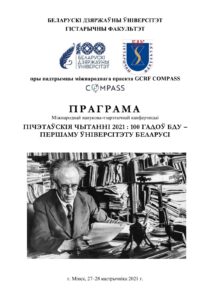 An International academic conference entitled, ‘Picheta Conference 2021: 100 years of the first university of Belarus’ was organised on the occasion of the 100th anniversary of the BSU. The two-day event was held in a blended mode (in-person and distant formats). The key topic was the role of the university in the development of education and science. The conference welcomed over 120 participants from Belarus, Russia, Germany, France and Ukraine. The plenary session was held on October 27th (blended mode) and panels were held online on October 28th. The Conference Proceeding will be published, including online, in due course. The conference was held with the support of the GCRF COMPASS project. The full program is available here https://hist.bsu.by/attachments/article/8689/Program_Picheta_2021_final.pdf
An International academic conference entitled, ‘Picheta Conference 2021: 100 years of the first university of Belarus’ was organised on the occasion of the 100th anniversary of the BSU. The two-day event was held in a blended mode (in-person and distant formats). The key topic was the role of the university in the development of education and science. The conference welcomed over 120 participants from Belarus, Russia, Germany, France and Ukraine. The plenary session was held on October 27th (blended mode) and panels were held online on October 28th. The Conference Proceeding will be published, including online, in due course. The conference was held with the support of the GCRF COMPASS project. The full program is available here https://hist.bsu.by/attachments/article/8689/Program_Picheta_2021_final.pdf
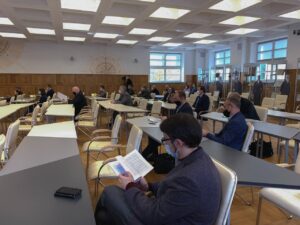
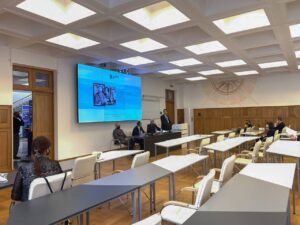
Ghent International Conference September 2021
“EURASIAN INSIGHTS: Past, current and upcoming dynamics in the Central Asian region, and their (possible) impacts for Europe”
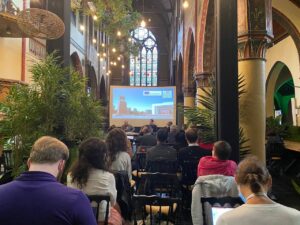 This three-day international conference was organized from 22 to 24 September 2021 by the University of Ghent, which took place in the city of Ghent (Belgium). This event was funded by the European Union Erasmus+ program, through the EISCAS project.
This three-day international conference was organized from 22 to 24 September 2021 by the University of Ghent, which took place in the city of Ghent (Belgium). This event was funded by the European Union Erasmus+ program, through the EISCAS project.
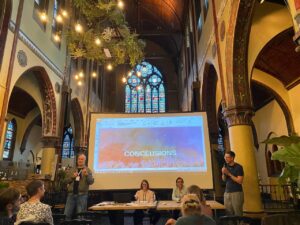 This conference was the main EISCAS information dissemination event. The main goal of the event was aimed at gathering scientists and experts from all over Europe and beyond to discuss future developments in Central Asia, to study in which direction the field of research is developing.
This conference was the main EISCAS information dissemination event. The main goal of the event was aimed at gathering scientists and experts from all over Europe and beyond to discuss future developments in Central Asia, to study in which direction the field of research is developing.
During the presentation of scientific papers, scientists drew attention to the importance of Central Asia for the EU and Eurasia as a whole. Certain conclusions and forecasts were also made regarding the role and cooperation of Central Asia with the EU in the development of relations by 2050.
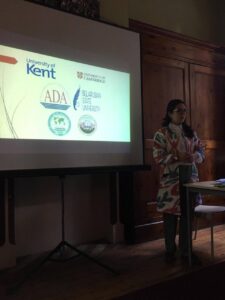 Nargiza Sodikova, PhD student at the University of World Economy and Diplomacy, GCRF COMPASS Research Affiliate, took part in this conference with a paper on the topic: EU-CA: development of relations, including the period of a pandemic. In her speech, she shared with the participants about the GCRF Compass project activity.
Nargiza Sodikova, PhD student at the University of World Economy and Diplomacy, GCRF COMPASS Research Affiliate, took part in this conference with a paper on the topic: EU-CA: development of relations, including the period of a pandemic. In her speech, she shared with the participants about the GCRF Compass project activity.
During the panel presentations, the participants explored thematical topics in various fields, in particular, issues of art, cultural heritage, traditions, identity, gender equality, leadership, international relations, cultural diplomacy, soft power, regional studies, regional integration were considered. There were separate panels dedicated to CA issues, regional interaction with the European Union, and a special panel dedicated to Afghanistan was held.
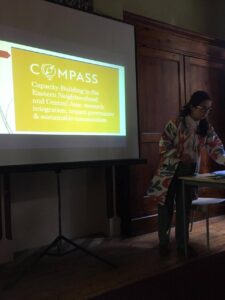 Nargiza Sodikova took part in a panel dedicated to the EU and Central Asia. This panel was moderated by Maria Raquel Freire from the University of Coimbra. Along with Nargiza Sodikova, this panel was attended by Siemen Van den Broecke from the European University Institute, Fiesole, with the topic “Legal constraints in the development of EU-Eurasian trade relations” and Maria Raquel Freire with the topic “Central Asia in the EU and Russian (in)security agendas: selective engagement, strategic opportunity or competing rivalry?”
Nargiza Sodikova took part in a panel dedicated to the EU and Central Asia. This panel was moderated by Maria Raquel Freire from the University of Coimbra. Along with Nargiza Sodikova, this panel was attended by Siemen Van den Broecke from the European University Institute, Fiesole, with the topic “Legal constraints in the development of EU-Eurasian trade relations” and Maria Raquel Freire with the topic “Central Asia in the EU and Russian (in)security agendas: selective engagement, strategic opportunity or competing rivalry?”
In her speech, Nargiza Sodikova considered on the issues of interaction between the EU and Central Asia, development trends based on the adopted New EU Strategy in 2019 towards the Central Asian countries, possible risks of cooperation and shortcomings, including the period of a pandemic. In addition to participating in the panel with the presentation, Nargiza Sodikova also took part in other panels
GCRF COMPASS ADA Conference ‘Connecting the 3Bs: Brussels, Baku, Beijing. The EU/UK & China cooperation initiatives for greater connectivity of Eurasia: the role of Azerbaijan’
Conference Proceedings
DAY ONE
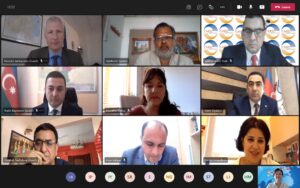 On 16 June 2021, under the aegis of the GCRF COMPASS project, ADA University kicked off the 1st day of its 3B conference with the official welcome from Dr Anar Valiyev (Dean of SPIA), EU Ambassador Kestutis Jankauskas, Dr Taleh Ziyadov (Director-General Port of Baku), Prof. Elena Korosteleva (COMPASS PI, Kent), and Dr Siddharth Saxena (COMPASS COI, Cambridge). It was followed by the plenary session which examined the global connectivity agenda inclusive of opportunities and challenges.
On 16 June 2021, under the aegis of the GCRF COMPASS project, ADA University kicked off the 1st day of its 3B conference with the official welcome from Dr Anar Valiyev (Dean of SPIA), EU Ambassador Kestutis Jankauskas, Dr Taleh Ziyadov (Director-General Port of Baku), Prof. Elena Korosteleva (COMPASS PI, Kent), and Dr Siddharth Saxena (COMPASS COI, Cambridge). It was followed by the plenary session which examined the global connectivity agenda inclusive of opportunities and challenges.
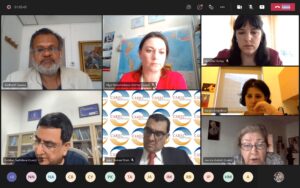 Prof. Peter Nolan (Cambridge) looked at the role of China in facilitating the east-west connectivity; while Lord Teverson considered the less optimistic future scenario in the aftermath of the G7 summit & NATO meeting positing China as a threat. Dr Ziaydov and Mr Bayramov (TRACECA secretary) underscored the need for a more pragmatic approach and Prof. Munira Shahidi advocated for cultural connectivity as a precursor for enhanced cooperation.
Prof. Peter Nolan (Cambridge) looked at the role of China in facilitating the east-west connectivity; while Lord Teverson considered the less optimistic future scenario in the aftermath of the G7 summit & NATO meeting positing China as a threat. Dr Ziaydov and Mr Bayramov (TRACECA secretary) underscored the need for a more pragmatic approach and Prof. Munira Shahidi advocated for cultural connectivity as a precursor for enhanced cooperation.
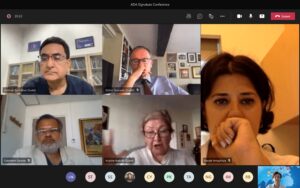 The next panel focused on the economic, transport, and technological dimensions of connectivity. The virtual conference attracted over 100 international participants, and was a testimony to the success of hard work of Nargiz Ismayilova, Dr Muzaffer Kutlay and the COMPASS team. Day One video available here.
The next panel focused on the economic, transport, and technological dimensions of connectivity. The virtual conference attracted over 100 international participants, and was a testimony to the success of hard work of Nargiz Ismayilova, Dr Muzaffer Kutlay and the COMPASS team. Day One video available here.
DAY TWO
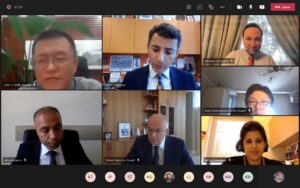 Day 2 of the 3B conference continued with a further 3 panels focusing on 1) green energy, transport and business connectivity, involving esteemed speakers from ADA University (Fariz Ismailzade), Ministry of Energy (Dr Elnur Soltanov), SOCAR Oil company and Alart Free Economic zone, and a speaker from SASS, China;
Day 2 of the 3B conference continued with a further 3 panels focusing on 1) green energy, transport and business connectivity, involving esteemed speakers from ADA University (Fariz Ismailzade), Ministry of Energy (Dr Elnur Soltanov), SOCAR Oil company and Alart Free Economic zone, and a speaker from SASS, China;
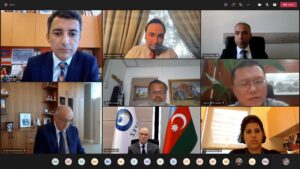 2) political connectivity brining speakers from Washington (Eugene Chausovsky), and the international COMPASS consortium (Prof. Roza Turarbekova, Dr Akram Umarov, Dr Kavus Abushov,); and 3) inter-cultural connectivity debating resilience, territorialised cultures and the need for more inter-cionnected outlook – with Prajakti Kalra, Dr Anar Valiyev, Dr Artsiom Nazaranka and Dr Nargis Nurulla-Khodzhaeva from the GCRF COMPASS.
2) political connectivity brining speakers from Washington (Eugene Chausovsky), and the international COMPASS consortium (Prof. Roza Turarbekova, Dr Akram Umarov, Dr Kavus Abushov,); and 3) inter-cultural connectivity debating resilience, territorialised cultures and the need for more inter-cionnected outlook – with Prajakti Kalra, Dr Anar Valiyev, Dr Artsiom Nazaranka and Dr Nargis Nurulla-Khodzhaeva from the GCRF COMPASS. 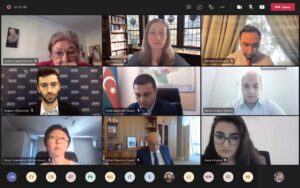
The Day Two video is available here. The conference programme is available here.
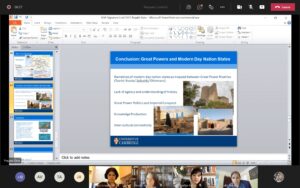
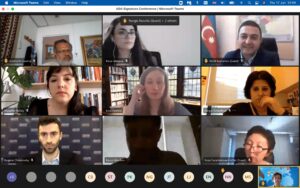
International Tartu Conference, 7th-8th June 2021
On 7 June 2021, the COMPASS project opened the 1st day of the 5th International Tartu Conference, with two panels.
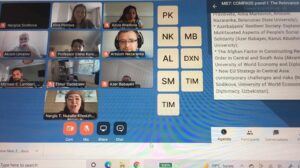 Panel 1 was premised on a Special Issue ‘The Making of Resilient Communities in Central Eurasia’ currently under review with Cambridge Review of International Affairs and included presentations from Timur Dadabaev (Tsukuba University, Japan), Nargis Nurulla-Khodjaeva (MGU, Russia), Artsiom Nazaranka (BSU, Belarus), Azer Babayev (ADA University, Azerbaijan), Akram Umarov and Nargiza Sodikova (UWED, Uzbekistan) to discuss the salience of ‘the local’ in rethinking theory, the human community, security and order across Central Eurasian locality.
Panel 1 was premised on a Special Issue ‘The Making of Resilient Communities in Central Eurasia’ currently under review with Cambridge Review of International Affairs and included presentations from Timur Dadabaev (Tsukuba University, Japan), Nargis Nurulla-Khodjaeva (MGU, Russia), Artsiom Nazaranka (BSU, Belarus), Azer Babayev (ADA University, Azerbaijan), Akram Umarov and Nargiza Sodikova (UWED, Uzbekistan) to discuss the salience of ‘the local’ in rethinking theory, the human community, security and order across Central Eurasian locality.
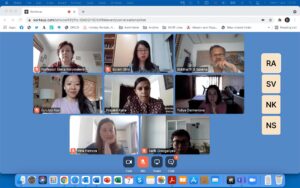 Panel 2 was based on a Special Issue ‘Are we fragile? Eurasian Perspectives’currently under review with the Journal of Eurasian Studies, and included presentations from Yulia Darmenova (Karaganda University, Kazakhstan) /Eunjoo Koo (McGill, Canada), Irina Petrova/Elena Korosteleva (Kent UK), Boram Shin (Jeonbuk University, South Korea), Serik Orazagaliev (Nazarbayev University, Kazakhstan), Prajakti Kalra/Siddharth Saxena (Cambridge UK) to focus on understanding fragilities in a post-neoliberal context. For more information please see the programme or refer to the conference website here. The 1st International Tartu Conference was launched by the UPTAKE project, which the University of Kent was part of.
Panel 2 was based on a Special Issue ‘Are we fragile? Eurasian Perspectives’currently under review with the Journal of Eurasian Studies, and included presentations from Yulia Darmenova (Karaganda University, Kazakhstan) /Eunjoo Koo (McGill, Canada), Irina Petrova/Elena Korosteleva (Kent UK), Boram Shin (Jeonbuk University, South Korea), Serik Orazagaliev (Nazarbayev University, Kazakhstan), Prajakti Kalra/Siddharth Saxena (Cambridge UK) to focus on understanding fragilities in a post-neoliberal context. For more information please see the programme or refer to the conference website here. The 1st International Tartu Conference was launched by the UPTAKE project, which the University of Kent was part of.
‘Achieving SDGs in Central Asia in the wake of COVID-19: Opportunities and threats’ – UWED and GCRF COMPASS Conference, 21st May 2021
The UWED team, together with the COMPASS project partners, the Senate of the Uzbek Parliament and UNDP, organised a conference on ‘Achieving SDGs in Central Asia in the wake of COVID-19: Opportunities and threats’. The online conference hosted over 100 participants, and included a welcoming word from His Excellency Sodyk Safoev, First Deputy Chairman of the Senate of the Oliy Majlis, Mr Komiljon Karimov, Rector of UWED, Ms Matilda Dimowska, UNDP Representative in Uzbekistan, Prof. Elena Korosteleva, PI COMPASS, and Dr Siddharth Saxena, COI COMPASS. The conference discussed many issues relating to the implementation of SDGs and international aid, and involved members of COMPASS – Dr Ulugbeck Khasanov, Prof. Victor Shadurski (Belarus), Dr Faizullo Barotzoda (TNU), Prof. Roza Turarbekova (BSU), Prof. Munira Shahidi (TNU), Fariz Ismailzade (ADA) – and its Advisory Board members – Lord Teverson (House of Lords UK); Prof. Fabienne Bossuyt (Ghent), and Prof. Nargis Nurulla-khodjaeva (MGU). The conference agenda is available here.
International conference on the impact of the COVID-19 pandemic on the Sustainable Development Goals in Central Asia
The University of World Economy and Diplomacy in partnership with the Senate of the Oliy Majlis of the Republic of Uzbekistan, GCRF COMPASS international project and UNDP representative office in Uzbekistan hosted an international scientific and practical conference on the topic: “Achieving the Sustainable Development Goals in Central Asia in the wake of COVID-19: opportunities and threats.” 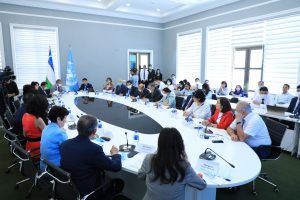
It was attended by members of the Senate of the Oliy Majlis, representatives of ministries and departments of the country, experts of the UN and other international organizations, scientists and researchers from Central Asian countries, foreign universities and research institutes, as well as faculty members, senior researchers-applicants of the UWED. 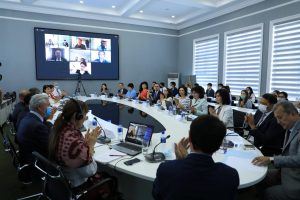
At the opening of the international conference First Deputy Chairman of the Senate of the Oliy Majlis Sodik Safoev, Rector of the University of World Economy and Diplomacy Komiljon Karimov, UNDP Resident Representative in Uzbekistan Matilda Dimovska, Principal Investigator of the GCRF COMPASS project Professor Elena Korosteleva (University of Kent, UK), Co-Investigator of the GCRF COMPASS project Professor Siddhart (Montu) Saxena (University of Cambridge, UK) shared their vision on the ongoing global challenges provoked by pandemic, existing difficulties in the implementation of SDGs and perspectives of their achievement in the new realities.
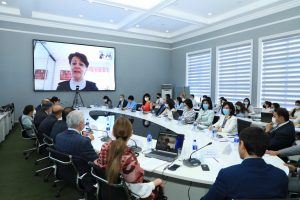 In Central Asia, the most pressing issues today are addressing the decline in global trade indicators caused by the pandemic through regional cooperation, supporting the small business sector affected by COVID-19, addressing the quarantine period in the areas of consumer services, textiles and trade, and developing parliamentarism in society. During the conference, the issues of ensuring economic growth, reducing poverty and inequality, strengthening social protection, aspects of international cooperation, threats and opportunities in achieving the SDGs in the context of the COVID-19 pandemic and others were discussed in four thematic sections.
In Central Asia, the most pressing issues today are addressing the decline in global trade indicators caused by the pandemic through regional cooperation, supporting the small business sector affected by COVID-19, addressing the quarantine period in the areas of consumer services, textiles and trade, and developing parliamentarism in society. During the conference, the issues of ensuring economic growth, reducing poverty and inequality, strengthening social protection, aspects of international cooperation, threats and opportunities in achieving the SDGs in the context of the COVID-19 pandemic and others were discussed in four thematic sections.
The speeches of experts focused on ensuring economic growth and employment, the effectiveness of the social protection system during the COVID-19 pandemic and in the post-crisis period, institutional and legal aspects of effective governance, expanding international cooperation for sustainable development, improving health systems, improving the quality of education and services, and preventing the effects of climate change. The participants analysed the experience of applying systemic measures to counter the pandemic, acquired by the countries of the region, which allowed them to develop important scientific and practical proposals and recommendations for overcoming the risks and threats caused by the spread of COVID-19, for overcoming the crisis and further advancing the implementation of the SDGs in Central Asia. Recording of the event is available here.
COMPASS ADA University Signature Conference 16-17 June 2021 (local time; UTC/GMT+4)
Connecting the 3 Bs: Brussels, Baku, Beijing
The EU/UK & China cooperation initiatives for greater connectivity of Eurasia: the role of Azerbaijan
The GCRF COMPASS Signature Conference at ADA University in Baku will bring together policy-makers, practitioners, business, and academics to discuss existing regional powers’ strategic priorities, instruments and practices in regional connectivity for mutual benefit. The programme is now available: Conference Programme.
ADA International Conference – Vision for South Caucasus: Post-Conflict Development and Cooperation
A three-day long international conference “New Vision for South Caucasus: Post-Conflict Development and Cooperation” has been held and organized by ADA University on 10-13 April 2021. 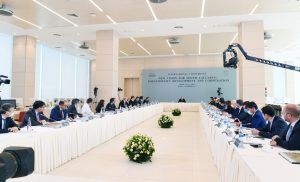 As part of the conference there was a visit of heads of foreign think tanks and international experts to Azerbaijan, including but not limited to Matthew Bryza, former co-chair of the Minsk Group, Laurence Broers, London-based peacebuilding organization Conciliation Resources, Dr Carlo Frappi from University of Venice, Dr Svante Cornell from Swedish Director of Institute for Security and Development Policy. On the first day of the conference held at ADA University,
As part of the conference there was a visit of heads of foreign think tanks and international experts to Azerbaijan, including but not limited to Matthew Bryza, former co-chair of the Minsk Group, Laurence Broers, London-based peacebuilding organization Conciliation Resources, Dr Carlo Frappi from University of Venice, Dr Svante Cornell from Swedish Director of Institute for Security and Development Policy. On the first day of the conference held at ADA University, 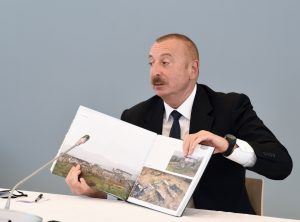 the Minister of Foreign Affairs Jeyhun Bayramov and Rector of ADA University Hafiz Pashayev chaired the Forum and discussed issues of the future of the South Caucasus region; reintegration and recovery processes were touched upon and the questions of the participants were answered. The second day of the conference was devoted to a trip to the liberated Aghdam region where participants witnessed the destruction of Aghdam city, occupied by the Armenian forces for almost 30 years. President of the Republic of Azerbaijan, Mr. Ilham Aliyev, joined the third day of the conference and delivered a speech on military operations
the Minister of Foreign Affairs Jeyhun Bayramov and Rector of ADA University Hafiz Pashayev chaired the Forum and discussed issues of the future of the South Caucasus region; reintegration and recovery processes were touched upon and the questions of the participants were answered. The second day of the conference was devoted to a trip to the liberated Aghdam region where participants witnessed the destruction of Aghdam city, occupied by the Armenian forces for almost 30 years. President of the Republic of Azerbaijan, Mr. Ilham Aliyev, joined the third day of the conference and delivered a speech on military operations 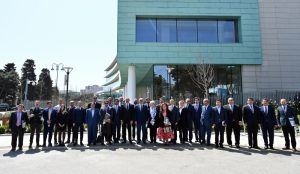 during the 44-day war, the victory of Azerbaijan, the ongoing political processes in the region after the war and answered questions.
during the 44-day war, the victory of Azerbaijan, the ongoing political processes in the region after the war and answered questions.
International Conference: Uzbekistan in the Context of Regional Security and Global Change, 7-8 November 2019, Tashkent, Uzbekistan
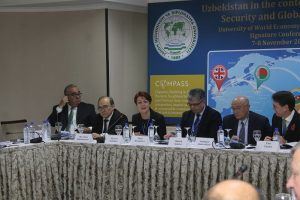
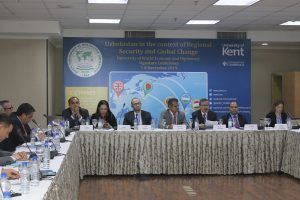
On 7-8 November 2019 a high-level Signature Conference “Uzbekistan in the context of Regional Security and Global Change” was organised by the University of World Economy and Diplomacy (UWED) under the aegis of the GCRF COMPASS project. The conference focused on the ongoing reforms in the country, Uzbekistan’s role in the region of wider Eurasia, as well as the relations with the European Union, Russia, US and China.
The conference was attended by the representatives from Uzbekistan’s government, government and the House of Lords of the United Kingdom, Head of the EU Delegation to Uzbekistan, as well as scholars from the COMPASS Consortium and leading researchers from the EU, UK, Russia, US, China and Afghanistan.
The conference was opened by Professor Abdujabar Abduvakhitov, Rector of UWED, and included welcome words from Deputy Minister Dilshod Akhmatov, Uzbek MFA; HE Tim Torlot, UK Ambassador; Professor Elena Korosteleva, COMPAS PI Kent and Dr Siddharth Saxena, COMPASS COI Cambridge. The first keynote speech was delivered Professor Roy Allison (University of Oxford) on the challenges and prospects for Central Asian regionalism, who discussed the three decades of regional integration efforts and analysed the renewed opportunities for cooperation in the region. The second keynote was delivered by Professor Andrew Kuchins (American University of Central Asia, Kyrgyzstan, USA), who reviewed the US policy towards Uzbekistan and Central Asia and noted an important shift in cooperation as a result of new leadership both in Uzbekistan and US. The plenary session, moderated by Professor Elena Korosteleva featured the two keynote speakers, along with Lord Teverson (House of Lords and COMPASS AB member, UK), Sherzod Abdullaev (University of World Economy and Diplomacy, Uzbekistan) and Irina Zvyagelskaya (Primakov Institute of World Economy and International Relations, Russian Federation). The key themes of the plenary included the need of enhanced cooperation for tackling the environmental crises and vulnerabilities created by the increasing connectivity, the need of strengthening regional identity, as well as the importance of overcoming knowledge gaps in Wider Eurasia.
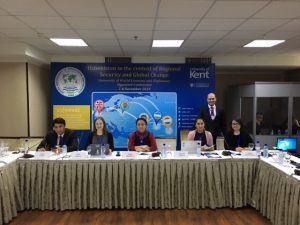 Apart from the distinguished international scholars, the conference also featured a panel by junior scholars from the COMPASS Consortium including – Dr Irina Petrova (Kent); Nilufar Rakhmatullaeva (UWED); Matlyuba Salikova (TNU) and Temur Islamov (UWED).
Apart from the distinguished international scholars, the conference also featured a panel by junior scholars from the COMPASS Consortium including – Dr Irina Petrova (Kent); Nilufar Rakhmatullaeva (UWED); Matlyuba Salikova (TNU) and Temur Islamov (UWED).
Many thanks go to all local conference organisers, and all those who worked tirelessly behind the scenes.
Final programme Conference website Conference proceedings
International Conference: Cultural Diplomacy in Central Asia and Eurasia. 16 -17 September, Dushanbe, Tajikistan
On 16 and 17 September 2019 the Tajik National University (TNU) organised a conference themed ‘Tajikistan and Cultural Diplomacy in Central Asia’. During the two-day conference a wide range of speakers discussed current opportunities and challenges for Tajikistan in the areas of cultural diplomacy, regional security, and sustainable development. Many of the discussions were focused around the Tajik government’s National Development Strategy 2030, a key document highlighting the country’s priorities for the upcoming decade.
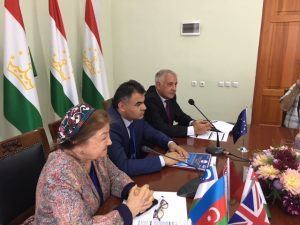
The conference attracted over 70 participants, including members from the COMPASS consortium; scholars from the TNU, as well as local universities and research institutes; and representatives of the UK government and the European Union. Additionally, around 30 TNU students attended the conference actively participating in Q&A both in English and Russian.
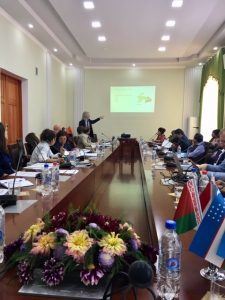 The first day of the conference was concluded with a key note speech by EU Special Representative for Central Asia, His Excellency Ambassador Peter Burian; and a Q&A session with both Ambassador Burian and Ambassador Marilyn Josefson, Head of the EU Delegation in Dushanbe. A plenary session on the meaning of cultural diplomacy and its application in Tajikistan formed the final part of the conference. Being chaired by Professor Korosteleva, the panel included HM Ambassador Matthew Lawson (UK), Lord Sheikh (House of Lords), Prof Munira Shahidi (TNU), and Dr Siddharth Saxena (Cambridge). The speakers reflected on the importance of resilience-building, UK sustainable development strategy and the current challenges and opportunities faced by Tajikistan and the wider region.
The first day of the conference was concluded with a key note speech by EU Special Representative for Central Asia, His Excellency Ambassador Peter Burian; and a Q&A session with both Ambassador Burian and Ambassador Marilyn Josefson, Head of the EU Delegation in Dushanbe. A plenary session on the meaning of cultural diplomacy and its application in Tajikistan formed the final part of the conference. Being chaired by Professor Korosteleva, the panel included HM Ambassador Matthew Lawson (UK), Lord Sheikh (House of Lords), Prof Munira Shahidi (TNU), and Dr Siddharth Saxena (Cambridge). The speakers reflected on the importance of resilience-building, UK sustainable development strategy and the current challenges and opportunities faced by Tajikistan and the wider region.
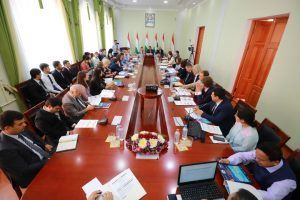
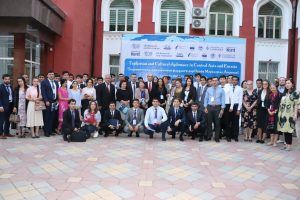
The conference was organised by the TNU COMPASS team under the leadership of Professor Munira Shahidi, with the support of Professors Samiev and Salimov. Its implementation was further assisted by the charity organisation ‘Peshraft’ led by Matlyuba Salikhova, and COMPASS postdocs – Diana T. Kudaibergenova, Irina Petrova and Eske van Gils.
The conference will be followed by an international-level forum in September 2020 and a Training School for the Early Career Scholars.
2018-2019 Academic Year
COMPASS Joint Conferences during the 2018-2019 academic year
2018-2019 was a busy year for the COMPASS project, ending with the prestigious signature conference at the University of Kent at the beginning of July 2019. Whilst COMPASS provided direct financial support to the conferences below, COMPASS members attended a considerable number of international conferences as speakers and panel members including ESCAS 2019, Belarus in the Modern World, ISA 60th Annual Convention and others, short descriptions of which can be found on the 2018-2019 News page.
GCRF COMPASS SIGNATURE CONFERENCE @Kent: Governance and Resilience in Wider Eurasia: are cooperative orders possible? 30 June -2 July 2019
 Between 30 June and 2 July the Kent COMPASS team organised a stream at the GCRF Conference that was held for the second year in a row at the University of Kent. The stream was titled ‘Governance and Resilience in wider Eurasia: Are cooperative orders possible?’ and hosted 60 participants. In three panels and two plenary sessions international experts reflected on recent developments in wider Eurasia, from the angle of cooperation between the region and the EU, EEU and under the BRI initiative.
Between 30 June and 2 July the Kent COMPASS team organised a stream at the GCRF Conference that was held for the second year in a row at the University of Kent. The stream was titled ‘Governance and Resilience in wider Eurasia: Are cooperative orders possible?’ and hosted 60 participants. In three panels and two plenary sessions international experts reflected on recent developments in wider Eurasia, from the angle of cooperation between the region and the EU, EEU and under the BRI initiative.
The conference opened with a welcome by Professor Elena Korosteleva, COMPASS PI, and Dr Adrian Pabst, Head of School of Politics and International Relations, followed by a Plenary session titled ‘Uncertainty and a changing order’, where speakers (t. Flockhart, A. Lukin, K. Brown) discussed their views on current affairs in light of changing power dynamics in global politics.
Two panel sessions reflected on the theme of ‘The EU and wider Eurasia: challenges and opportunities’. The first looked at relations between the European Union and different states in the Eurasian region, whilst the second addressed this topic from the angle of the Eurasian Economic Union. The third panel of the conference covered the thematic of challenges and opportunities from the perspective of the Belt and Road Initiative.
The second Plenary took place on the final day of the conference and was titled ‘Are cooperative orders possible in the wider Eurasian region?’. Six speakers shared their views about the possibilities of cooperation, bringing together insights from academia and policy-making.
The conference provided a platform for ‘excellent discussions’ exploring the widening relationships between Europe and Central Asia and also offered plenty of networking opportunities. Speakers and conference observers have been invited to contribute to working proceedings, which will soon be made available on the project website and the Kent COMPASS team are exploring options for a Special Issue as an output of the event.
Final programme, Conference proceedings
Conference: Towards Inclusive and Equitable Quality Education: Opportunities for Action, ADA University, Baku, 19-20 June 2019
This year’s ADA Education Conference theme is pivoted around Sustainable Development Goal # 4, namely, ensuring inclusive and equitable quality education and promoting lifelong learning opportunities for all. ADA University in partnership with the Ministry of Education of Azerbaijan and GCRF COMPASS project is delighted to invite researchers and policymakers in the field of education to submit their research papers to be presented at the ADA 4th International Education Conference.
The Conference aims at bringing together scholars, policymakers, independent researchers, educational practitioners, students and other stakeholders interested in national and international education development to present research analyzing educational strategies around the world and in Azerbaijan to reflect on best practices, discuss future steps and suggest policy recommendations for inclusive and equitable quality education system.
COMPASS Student Convention, BSU, Minsk, 25 – 27 April 2019
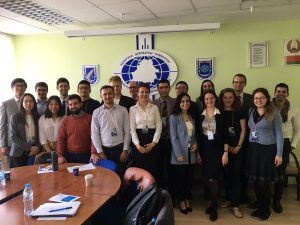 The first GCRF COMPASS Student Convention titled “Integration of integrations: status quo, challenges and perspectives” was held in Minsk as part of the 76th BSU Annual Students Scientific Conference. The forum gathered over 20 participants (students and junior researchers) from all COMPASS partner universities – Kent, Cambridge, UWED, TNU, BSU but also from University of Giessen (Germany).
The first GCRF COMPASS Student Convention titled “Integration of integrations: status quo, challenges and perspectives” was held in Minsk as part of the 76th BSU Annual Students Scientific Conference. The forum gathered over 20 participants (students and junior researchers) from all COMPASS partner universities – Kent, Cambridge, UWED, TNU, BSU but also from University of Giessen (Germany).
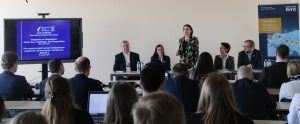 At the opening session on April 25th, participants were welcomed by HE British Ambassador to Belarus Ms Fionna Gibb, GRCF COMPASS Principal Investigator Professor Elena Korosteleva, Dean of the BSU Faculty of International Relations Professor Victor Shadurski and Belarus COMPASS NTL Artsiom Nazaranka. The plenary session included reports by UWED students S. Yodgorov and O.Akromov on Uzbekistan`s New Foreign & Regional Policy.
At the opening session on April 25th, participants were welcomed by HE British Ambassador to Belarus Ms Fionna Gibb, GRCF COMPASS Principal Investigator Professor Elena Korosteleva, Dean of the BSU Faculty of International Relations Professor Victor Shadurski and Belarus COMPASS NTL Artsiom Nazaranka. The plenary session included reports by UWED students S. Yodgorov and O.Akromov on Uzbekistan`s New Foreign & Regional Policy.
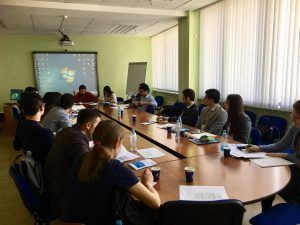 Young researchers presented and discussed their research findings in three panels – Integration initiatives in wider Eurasia, European Integration Project, Conceptualizing “Integration of Integrations”.
Young researchers presented and discussed their research findings in three panels – Integration initiatives in wider Eurasia, European Integration Project, Conceptualizing “Integration of Integrations”.
Further capacity-development was supported with training ‘Network-building for Success’ delivered by Giles Polglase, Faculty Director of Operations at Canterbury Christ Church University.
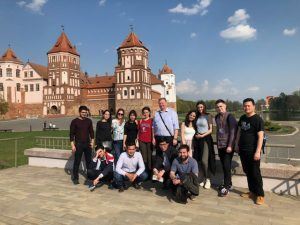 Special emphasis during the convention was to allow participants time for informal discussion of their research interests and component Cultural and Historical Backgrounds of Understanding Belarus including visiting National Library of Belarus, Great Patriotic War Museum, National Academic Bolshoi Opera and Ballet Theatre and UNESCO World Heritage Sights – Niesvizh Palace and Mir Castle.
Special emphasis during the convention was to allow participants time for informal discussion of their research interests and component Cultural and Historical Backgrounds of Understanding Belarus including visiting National Library of Belarus, Great Patriotic War Museum, National Academic Bolshoi Opera and Ballet Theatre and UNESCO World Heritage Sights – Niesvizh Palace and Mir Castle.
A collection of all reports will be published in the Fall 2019.
Conference: The role of university education and science in modern society: on the occasion of 100th anniversary of the Belarusian State University, Minsk, 26-27 February 2019
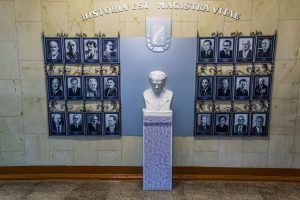
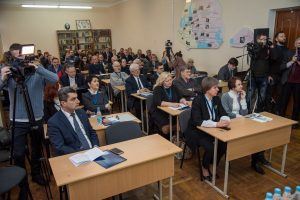
The conference was timed to coincide with the 100th anniversary of the adoption of the Soviet Belarus Government Decree of February 25, 1919 to open a University in Minsk. An international forum started the anniversary program of celebrating the 100th anniversary of the BSU in 2021. The opening speech was delivered by BSU Rector Professor Andrei Karol. Plenary sessions included reports made by leading BSU academics (professors O.Yanovski, G. Vasilevich, V. Shadurski) and Professor Igor Marzalyuk, Chair of the Standing Commission on Education, Culture and Science of the House of Representatives of the National Assembly of the Republic of Belarus.
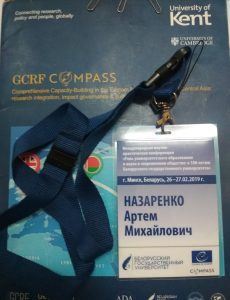 The event attracted over 170 researchers from Belarus, Russia, Poland, Germany, Slovakia and Turkey. During breakout sessions participants discussed the university’s achievements in research, educational and cultural fields, addressed issues of role and place of the university in the global academic community, as well as development strategies.
The event attracted over 170 researchers from Belarus, Russia, Poland, Germany, Slovakia and Turkey. During breakout sessions participants discussed the university’s achievements in research, educational and cultural fields, addressed issues of role and place of the university in the global academic community, as well as development strategies.
Today the BSU consists of 27 faculties and educational institutions, 6 research institutes and centers, 5 innovative enterprises, 2 joint innovation centers, and 42 research laboratories. For almost a century, BSU has trained more than 160,000 graduates, of which over 10,000 are foreign nationals.
The conference was supported by GCRF COMPASS project and Council of Europe Information Point in Minsk.
International Academic Conference ‘Belarus in Modern World’ 26 October 2018, Minsk
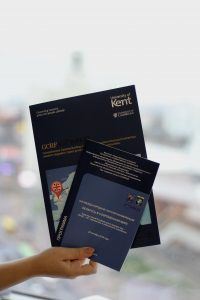 GCRF COMPASS supported the XVII International Scientific Conference “Belarus in Modern World” under the general topic “EEU-EU: opportunities of cooperation” (incl. XII International Scientific Conference “Intercultural Communication and Professionally-Oriented Teaching of Foreign Languages”) which took place on the 26th of October 2018.
GCRF COMPASS supported the XVII International Scientific Conference “Belarus in Modern World” under the general topic “EEU-EU: opportunities of cooperation” (incl. XII International Scientific Conference “Intercultural Communication and Professionally-Oriented Teaching of Foreign Languages”) which took place on the 26th of October 2018.
The conference examined the current problems of international relations, foreign policy and diplomacy of the Republic of Belarus and current trends in the development of the international legal personality of the Republic of Belarus, as well as the priorities and prospects of international economic cooperation of the country were investigated. Conference participants included academics from BSU and national policy-makers as well as a number of foreign delegates (including from Russia and Germany and others).
Proceedings are published and available online in the BSU e-library (ISBN 978-985-566-681-4 and ISBN 978-985-566-680-7)
http://elib.bsu.by/handle/123456789/215722
http://elib.bsu.by/handle/123456789/216005
2017 – 2018 Academic Year
Annual Tartu Conference 10 – 12 June 2018
The COMPASS team organised two panels at the Annual Tartu Conference in June 2018, titled ‘Challenges for the regional security and capacity-building in the Eastern Region and Central Asia: domestic perspective (1) and international (2) perspectives. Conference proceedings are available here.
